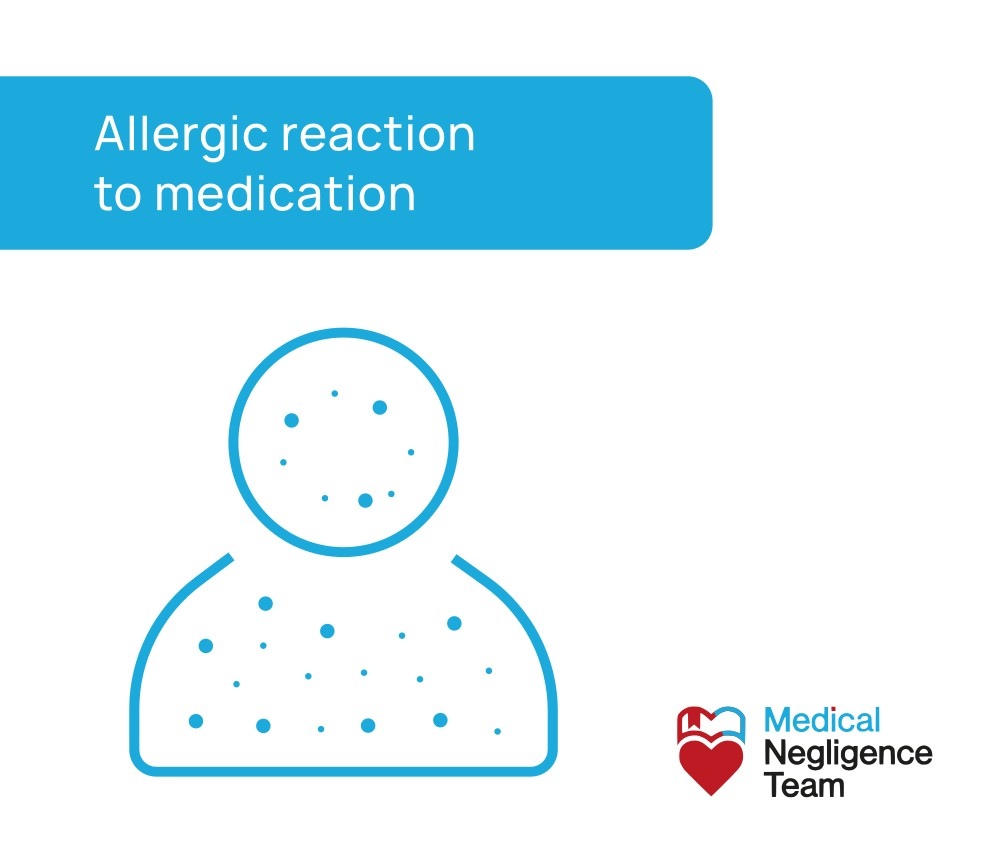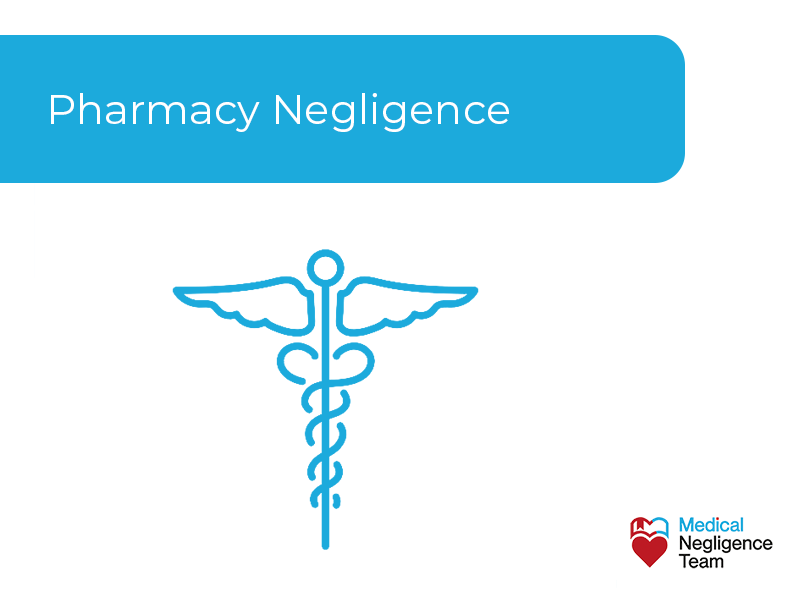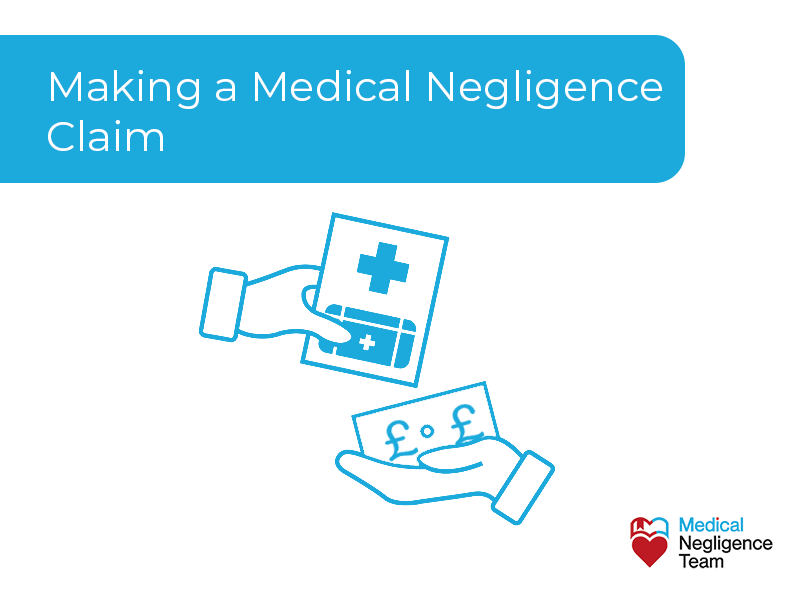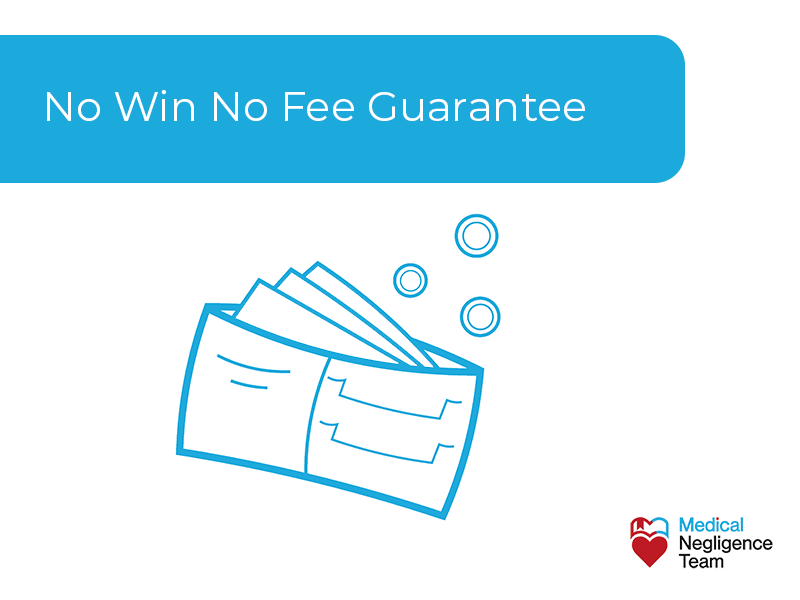An allergic reaction to medication is caused by taking medicine to which you are allergic. You can be very ill, lose consciousness and need hospital treatment.
It is shocking and can be a life-threatening situation.
Any doctor doing their job properly will not prescribe you the wrong medication. They should check your records and double-check that you do not have any drug allergies.
When a doctor wrongfully prescribes a medication to you where you have had a previous allergic reaction to medication, and you have that same allergic reaction, it is medical negligence.
It is care below expected standards, and you can file an allergic reaction to medication claim.

Table of content
Allergic reaction to medication overview
An allergic reaction to medication is when your immune system reacts to the medicine you take. Your drug allergy symptoms can take the form of developing a rash, high blood pressure, coming out in hives, nausea or even losing consciousness.
There are many other symptoms of a life threatening reaction to a drug, and the more serious allergic drug reactions can be life-threatening. Any severe reactions could need immediate treatment by medical professionals.
Anaphylactic shock is one of the better-known adverse drug reactions, and symptoms include difficulty breathing, increased heart rate and losing consciousness. People with a serious drug allergy usually wear a medical alert bracelet in case of an emergency.
If left untreated anaphylaxis is life-threatening, and immediate medical attention is required to relieve symptoms of it.

How does an allergic reaction to medication occur?
An allergic reaction to medication occurs when your body reacts badly to a drug you take. Your immune system thinks the medicine is a harmful substance and attacks it.
The chemical reaction from the attack is what you experience as allergy symptoms.
An allergic reaction can happen with chemotherapy drugs, nonsteroidal anti inflammatory drugs, over-the-counter and prescription medicines, or even a defective drug.
Who is responsible for my allergic reaction to medication?
A medical professional is responsible for your allergic reaction to medication. If your medical history shows that you can have an allergic reaction to certain medications like related antibiotics sulfa drugs, you should not be given those drugs.
Medical professionals such as doctors, nurses, pharmacists or hospital consultants are responsible for giving you medication. It is clinical negligence if the medical professional gives you the wrong medicine and you suffer an allergic reaction.
When they give you a medicine that gives you an allergic reaction which could have been anticipated, you have a compensation claim.
You can claim compensation for any illness, discomfort and loss of earnings you suffer as a result of the medical negligence.
How does medical negligence happen?
Medical negligence happens when a healthcare professional does not do their job properly. Checking your medical records should be their first job before giving you medicine so you do not have a serious allergic reaction.
A drug allergy involves you having a severe reaction due to someone not checking your records before giving you a medicine.
Examples of where medical negligence leads to an allergic reaction happening include:
Pharmacy negligence
Pharmacy negligence includes giving a client the incorrect medication. If they give you a medicine to which you are allergic, the results could be catastrophic.
The pharmacist should read your medical records before giving you any new medicine. It is a pharmacy negligence case when you have an allergic reaction to the medication they give you.
The pharmacy buddy system should ensure that two pharmacists check your medication before they hand the bag to you. Medical negligence should not happen at the pharmacy.
If you have a common drug allergy and have an adverse reaction to the medication, you can start a medical negligence compensation claim.
GP Medical Negligence
GP medical negligence is when the GP provides service below acceptable standards. It should never happen that they prescribe a medicine to which you have previously had an allergic reaction.
Your GP will know your medical history and should take action to prevent allergic reactions. You have a very strong clinical negligence claim when this happens.
Medical negligence claims can start when the GP does not check the symptoms of a drug. Personal injury claims for allergic reactions to medicine are common and easy to prove.
Hospital Medical Negligence
Hospital medical negligence claims include when a doctor prescribes a medication, and you have an allergic reaction.
The doctor may prescribe a medicine without reading your notes, but your immune system reacts, and you fall ill.
A busy nurse may put the wrong medication in your drip or give you the incorrect medicine on the daily rounds. It may be their error, but you could have a drug reaction.
Medical negligence can prolong your stay in hospital, and you can claim compensation for any financial losses or out-of-pocket expenses.
What are the types of allergic reactions to medication?
The types of allergic reactions to medication include stomach cramps, general pain and different kinds of skin rashes. Serious allergic reactions include anaphylactic shock and even death.
An allergic drug rash
An allergic drug rash is often the first sign that you were given a drug to which you have an allergic reaction. Allergic skin rash signs include bumps on the skin, hives and blisters and even a sensitivity to light.
Allergic reactions to medication
Allergic reactions can happen immediately or may develop over time. If you have a known reaction to a medication, you may recognise the symptoms as soon as they begin.
Types of allergic reactions to medication
Types of allergic reactions to medication include:

A medicine with a known allergy can give you any one of the above allergic reactions. If you were given the wrong medication and suffered one or more of the above symptoms, you could have a medical negligence claim.
Clinical negligence claims such as an allergic reaction to medication will get you compensation for any suffering caused.
Can I claim compensation for an allergic reaction to medication?
Yes, you can claim compensation for an allergic reaction to medication.
When your health suffers due to an allergic reaction you have a right to start a medical negligence claim. How much compensation you can claim depends on your circumstances.
Expert medical negligence solicitors
Expert medical negligence solicitors know how to claim for an allergic reaction to medication. They will guide you through the process and advise you on the maximum compensation you deserve for the harm caused by the medical negligence.
Always use a solicitor approved by the Solicitors Regulation Authority for compensation claims.
How do I claim for medical negligence?
You claim for medical negligence by finding a medical negligence solicitor specialising in medical negligence claims. They will outline the steps involved, advise you on how to follow them and how much compensation you can win.

Step 1: Preserve the evidence
Preserve all the evidence you have by taking pictures of the medication box, label and contents. Do this as soon as you realise you have suffered from an allergic reaction to a medication.
You should not throw any evidence away, such as receipts or the bag you got with the wrong medication.
Medical negligence cases are settled more quickly when you have a record of the evidence.
Step 2: Report the mistake
Report the mistake to the pharmacy, GP or hospital responsible for giving you the medication. They should undertake an investigation to work out how the error happened and report back to you.
It is important to recognise that this internal investigation is not a compensation claim but a separate investigation which will be useful for your allergic reaction to medication claim.
Once you receive a copy of this investigation, you pass it to your medical negligence solicitor handling your clinical negligence claim.
Step 3: Getting your medical records
Getting your medical records after you suffered the allergic reaction to medication is the next step. Your medical negligence solicitor will want access to your records to see what should be happening with your medications.
Your records will show the medicines you have an allergy to, and what happened in your case. All medical negligence cases rely strongly on your records.
By obtaining your medical history and the investigation report from the negligent party, the medical negligence solicitors can judge if you have a valid incorrect medication claim.
Step 4: Sending a letter of claim
Sending a letter of claim to the doctor, pharmacy or hospital happens when the personal injury solicitor sees clear evidence of an allergic reaction to medication claim.
In the letter of claim, they will outline exactly what happened and seek compensation for your clinical negligence claim.
The negligent party has four months to reply to the letter of claim.
Step 5: Receiving and reviewing the letter of response
Receiving and reviewing the letter of response from the negligent party is the next step. The pharmacy, GP or hospital’s solicitor will accept the blame or deny responsibility in the letter.
If the negligent party accepts responsibility, which they usually do, your solicitor will sit down with them.
At the meeting they can determine how much money you will get for your allergic reaction to medication compensation claim.
Step 6: Issuing court proceedings
Issuing court proceedings happen when the negligent party denies responsibility. It rarely happens with allergic reaction to medication claims, as the evidence is nearly always clear-cut and undeniable.
Less than 1% of medical negligence claims result in the issuing of court proceedings. Of those that do, only a tiny fraction ever even go to court.
Your medical negligence lawyer will issue the court proceedings and advise you on the process.
A No Win No Fee agreement
No Win No Fee claims agreement with your medical negligence solicitors means you do not charge you fees when your case is not successful. The Medical Negligence Team ‘s team of medical negligence lawyers only works on a No Win No Fee basis.
The Medical Negligence Team also have expert medical professionals to advise on clinical negligence cases. We have plenty of experience in cases of allergic reactions to medication.

A team of specialist solicitors
A team of specialist solicitors with experience in all kinds of medical negligence compensation claims will know if your case is valid. You will work with a specialist medical negligence solicitor from day one.
The No Win No Fee basis means you will not be out of pocket for the clinical negligence claim.
A 100% Compensation Guarantee
A 100% Compensation Guarantee ensures you get maximum compensation for suffering an allergic reaction. At Medical Negligence Team we operate a 100% Compensation Guarantee, along with the No Win No Fee policy, so all the money awarded to you in a successful claim goes into your pocket.
A personal injury claim is for your suffering, and you deserve the maximum compensation settlement. Personal injury lawyers should only operate on a No Win No Fee basis and offer a 100% Guarantee scheme.
Do not accept your solicitor charging you a success fee. They will be paid by the negligent party and a success fee should not come out of your pocket.
You should not be at any financial risk when fighting a medical negligence claim.
Is there a time limit on a medical negligence case?
Yes, there is a time limit on a medical negligence case.
All medical negligence claims are subject to limitation periods. In England and Wales medical negligence claims must generally be brought, court proceedings issued, within three years of the personal injury.
The time limits include three years from the date of death, if the limitation period has not expired by that time, or three years of knowledge of the facts giving rise to the claim.
Children, not with a disability, typically have until they reach 21 to start court proceedings.
Persons with a disability, who lack capacity, are not subject to any limitation period.
Make a Medical Negligence claim today
Contact us at Medical Negligence Team when you suffer an allergic reaction to medication due to medical negligence. We are experts in the medical negligence claims process.
Your alergic reaction to medication claim will be nothing new to the medical negligence lawyer working on your claim.
Medical Negligence Team work on No Win No Fee claims. Our team of specialist solicitors will get you maximum compensation with our 100% Compensation Guarantee scheme.
Contact us today for all your medical negligence claim needs.


